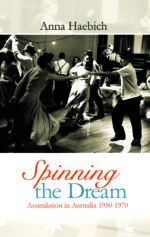Fremantle Press author shortlisted for a NSW Premier’s Award

Anna Haebich has been shortlisted for the Community Relations Commission Award as part of the 2009 NSW Premier’s Awards.
Spinning the Dream: assimilation in Australia 1950-1970 is one of six books nominated for the Award worth $15,000.
Professor Haebich said she was proud to be nominated for an award that prizes the diversity of Australia’s history.
“I am especially pleased to think that the judges appreciated my efforts to trace how assimilation has shaped the lives of immigrants, Indigenous people and other Australians throughout this history,” said Professor Haebich.
Professor Haebich said she wrote the book because she wanted to better understand the times that she and her partner, Aboriginal Health Council of WA CEO Darryl Kickett, grew up in on opposite sides of Australia.
The judges’ report describes Spinning the Dream as a compelling account of how a policy devised to reconcile a diverse population with an ideology of national homogeneity ended up exposing the paradoxes which led to its own undoing. It says the book makes a timely contribution to the history of the Australian people.
The Community Relations Commission Award is offered to a work deemed to have made a significant contribution to Australian literature, film, theatre, radio or television in its portrayal of the interaction of Australia’s diverse cultures, and which canvasses issues arising from the Australian immigration and migrant settlement experience.
The other nominees are; Philip Jones and Anna Kenny, Australia’s Muslim Cameleers: pioneers of the inland 1860-1930s, Jacqueline Kent, An Exacting Heart: the Story of Hephzibah Menuhin, Michelle Offen, East West 101: Chapter 5 – Haunted by the Past, Malcolm Prentis, The Scots in Australia and Eric Richards, Destination Australia: migration to Australia since 1901.
Professor Haebich’s last Fremantle Press publication, Broken Circles, won the NSW Premier’s Award for History and the Book of the Year Award in 2001.
Judges’ Report on Spinning the Dream
After the heyday of the White Australia policy but before the introduction of multiculturalism, assimilation was heralded as the solution to the challenges posed by Australia’s increasingly diverse population in the post World War II era. Anna Haebich’s book provides a comprehensive overview of the policies and practices of assimilation as applied to both ‘New’ and Indigenous Australians, tracing government action as well as rhetorical constructions of national identity at a time of massive change in the social and cultural fabric of the nation.
Thoroughly researched, and never losing sight of the underlying issues of race and culture as they weave in and out of debates about nationhood, Spinning the Dream makes an important and timely contribution to the history of the Australian people. Assimilation, though often decried, has received considerably less scholarly attention than the White Australia policy and multiculturalism. This book provides a compelling account of how a policy devised to reconcile a diverse population with an ideology of national homogeneity ended up exposing the paradoxes which led to its own undoing. A particularly instructive aspect of Haebich’s account is its comparative dimension: parallels between Indigenous and immigrant communities exposed to the ideal of assimilation and gradual loss of distinction.



